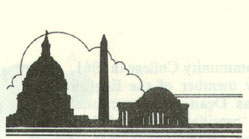

Washington
By TOM LITTLEWOOD
Intergovernmental Personnel Act: Unions want a share of training grants
WHEN amendments to the Intergovernmental Personnel Act (IPA) were before the House of Representatives in 1975, Rep. Wayne Hays (D., Ohio) dismissed the program as just "an opportunity for state bureaucrats to get together with federal bureaucrats and exchange ideas on how not to do anything at all." As it later turned out, the grouchy chairman of the House Administration Committee had somewhat more advanced notions about public personnel management.
The act that was passed in 1970 provided direct federal grants to help state and local governments improve their personnel systems. Matching funds were to be made available for various training and management projects; for the temporary assignment of federal employees to other government agencies; and to support graduate study in the form of government service fellowships. After the first three years, the 75 percent federal share was lowered to 50 per cent.
Funds were used to prepare Spanish language training manuals in Chicago and to conduct job classification and compensation studies in other Illinois cities and villages. About 400 federal workers were transferred to state and local jobs in Illinois, including the Walker administration's Environmental Protection Agency director, whose salary was paid out of federal funds.
In some states, the General Accounting Office found that the personnel exchanges were used by federal agencies to remove troublesome employees or to relocate good workers about to retire near where they hoped to retire to. Morale problems were sometimes created by the presence of federal employees working alongside other government personnel in the same jobs but generally at considerably higher pay.
The State of Illinois spent some of the
The House committee drafted a bill authorizing training grants to unions and guaranteeing union access to all information "relating to and affecting conditions of employment."
"Just as the IPA aims to bring greater management expertise to the collective bargaining table, so it should provide for the development of equal expertise on the side of labor," explained the majority. Rep. Edward Derwinski (R., Flossmoor, Ill.) and other minority members said it would be wrong to "equate labor organizations which have no governmental responsibilities with state and local governments for which the Act was specifically designed .... [It] would result in the involvement of the federal government in the sensitive area of local labor disputes." All the Illinois Democrats voted for the change in the law, and all the Republicans opposed it as the proposal passed the House, 213 to 189.
Before the legislation could be acted upon by the Senate, however, the powers and privileges of public employee unions had become more controversial. Early in 1976 a panel of the National Academy of Public Administration included in its review of the IPA grant program a statement that "it would be a serious mistake to award grants to public employee organizations for training in adversarial collective bargaining."
Sen. Edmund S. Muskie (D., Maine), chairman of the Subcommittee on Intergovernmental Relations, offered a compromise in an effort to get the union grant proposal through the full Government Operations Committee (on which Sen. Charles H. Percy of Illinois is the ranking Republican). Muskie suggested training grants to union negotiators, subject to the approval of the governor in the state.
But Muskie could not muster a majority of the committee, and the last Congress went out of business without approving any IPA amendments. The bill that passed the House would also have returned the federal matching share to 75 per cent, a step supported by the Ford administration but opposed by the House Republicans. The grant appropriation for the current fiscal year was the same as the last two years — $15 million. President Ford requested only $10 million, and the National Academy of Public Administration panel recommended $20 to $25 million.
Now, with a new Congress and a new administration, the legislative process begins again from the start. Jerry Wurf, national president of AFSCME, gave President Carter some timely assistance during last year's primary campaigns. Through their action in support of Carter, he and his union qualified for a preferred position on the President's roster of labor leaders. The House is more solidly pro-union than before. The Senate will decide the outcome. Ź
February 1977 / Illinois Issues / 31